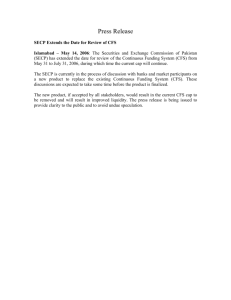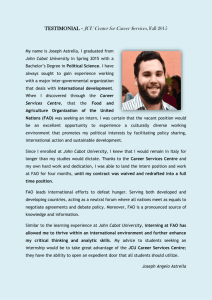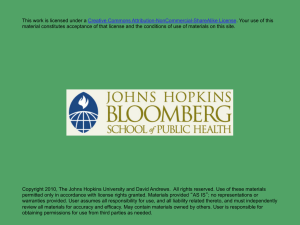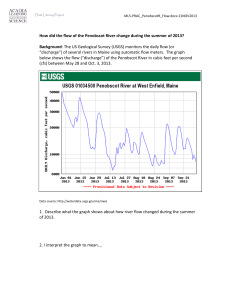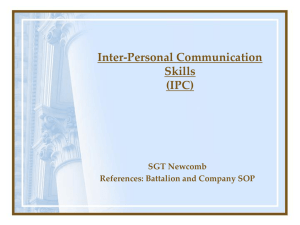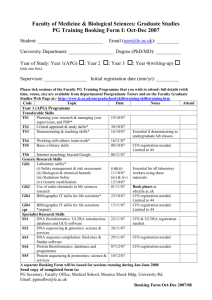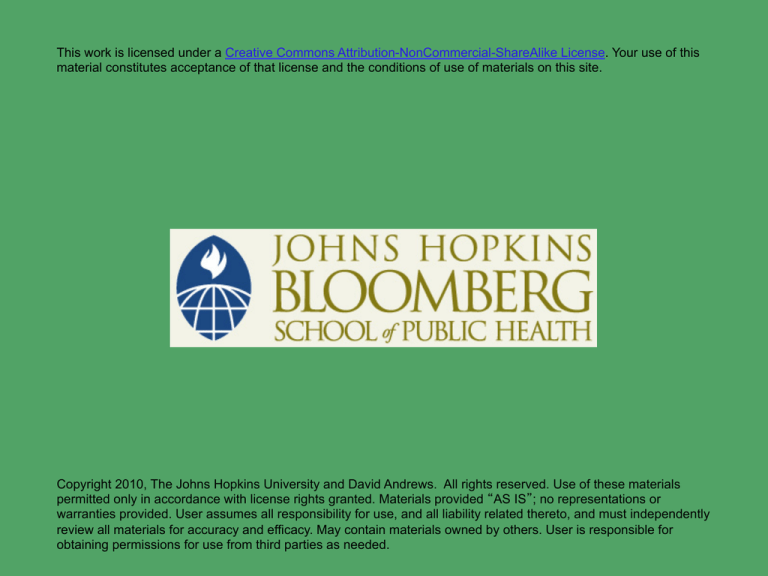
This work is licensed under a Creative Commons Attribution-NonCommercial-ShareAlike License. Your use of this
material constitutes acceptance of that license and the conditions of use of materials on this site.
Copyright 2010, The Johns Hopkins University and David Andrews. All rights reserved. Use of these materials
permitted only in accordance with license rights granted. Materials provided “AS IS”; no representations or
warranties provided. User assumes all responsibility for use, and all liability related thereto, and must independently
review all materials for accuracy and efficacy. May contain materials owned by others. User is responsible for
obtaining permissions for use from third parties as needed.
Section B
The Current Status of Policies and Structures
NGO Forum Solutions to Food Crisis: 1996
1. The capacity of family farmers, including indigenous peoples,
women, and youth, along with local and regional food systems,
must be strengthened
2. Concentration of wealth and power must be reversed and action
taken through agrarian reform and protection of farmers’ rights to
genetic resources
3. Agriculture and food production systems that rely on nonrenewable resources which negatively affect the environment must
be changed toward a model based on agro-ecological principles
3
Priorities of NGO Forum: 1996
4. National and local governments have the prime responsibility to
ensure food security. Their capacity to fulfill this role must be
strengthened, and mechanisms to ensure accountability must be
enhanced.
5. The participation of people’s organizations and NGOs at all levels
must be strengthened and deepened
6. International law must guarantee the right to food, ensuring that
food sovereignty takes precedence over macroeconomic policies
and trade liberalization. Food cannot be considered as a
commodity because of its social and cultural dimension.
4
Committee on Food Security
n
The CFS is and remains an intergovernmental Committee in FAO.
The reformed CFS as a central component of the evolving Global
Partnership for Agriculture, Food Security and Nutrition will
constitute the foremost inclusive international and
intergovernmental platform for a broad range of committed
stakeholders to work together in a coordinated manner and in
support of country-led processes towards the elimination of hunger
and ensuring food security and nutrition for all human beings. The
CFS will strive for a world free from hunger where countries
implement the voluntary guidelines for the progressive realization
of the right to adequate food in the context of national food
security.
5
Rights Approach Challenged an Economic Vision
n
The statement called for the opening of the Intergovernmental
Committee on Food Security to include participation by all actors of
civil society involved in the follow-up tasks assigned to the
committee
6
Multiple Dimensions of Change
n
Human rights as foundation, not macroeconomics
n
Production of food by agro-ecology, not industrial methods
n
Participation in governance by civil society
7
Vision of Particiption
Governments
FAO
Civil
Society
8
Civil Society Grows in Governance Participation
n
The IPC (International CSO Planning Committee on Food
Sovereignty) worked with the FAO in planning for the CSO
meeting of the World Food Summit+5 meeting in Rome
planned for 3 through 5 November 2001
n
A parallel civil society structure was adopted by the
Commission for Sustainable Development (CSD) held in
Johannesburg in 2002. Agenda 21 of the WSSD included a
description of the social actors.
9
Major Groups of CSD
n
Major Groups of CSD (Commission on Sustainable Development)
- NGOs, women, children and youth, indigenous people, farmers,
business people and industry, trade unions and workers, local
authorities, science and technology
10
IPC and Major Groups
n
IPC structure differed from Major Groups structure
- IPC emerged from ongoing civil society process of self-definition
- MGs predefined by an intergovernmental forum
- MG approach assumed broad category of people would come up
with consensus (e.g., La Via Campesina and IFAP)
- MG approach used global focal points, IPC depended on regional
and local consultation
- Private sector in MGs, not in IPC definition of civil society
11
Food Sovereignty Movement
n
Has advocated agro-ecology rather than industrialized food system
n
Has promoted the work of the IAASTD (International Assessment of
Agricultural Knowledge, Science and Technology for Development)
n
Has countered World Bank approaches to “land grabs”
n
Has encouraged climate justice
n
Has opposed biofuel production
n
Has opposed speculation on food and commodities
12
Food Sovereignty Movement
n
Has promoted gender justice in the food movement
n
Has linked health to food production
n
Has advocated just land tenure approaches
n
Links water issues to food and farm issues
n
Links peasant and indigenous rights, appreciates Mother Earth
spirituality: Bolivia, Ecuador, etc.
- UN endorsements of these concerns in recognizing indigenous
rights and moving toward peasants’ rights
13
IAASTD
n
IAASTD (International Assessment of Agricultural Knowledge, Science
and Technology for Development) was a UN-based project
completed in 2008
- Concluded that business as usual is no longer viable in
agricultural production
- Called for greater use of agro-ecology and a move away from
industrial-style production
14
Agro-ecology
n
Agro-ecology is a method of farming that uses natural systems and
biological methods of farming. It relies upon traditional knowledge
of farmers and farming methods.
15
Contemporary Trends
n
Rio+20 will take place in June 2012 with significant civil society
participation. Two themes are:
- “The green economy”
- Institutional and infrastructural support for sustainable
development
n
The Committee on Food Security meets at the FAO in Rome in
October near World Food Day (16 October) to refine international
efforts at food security
16
World Bank
n
The GAFSP (Global Agriculture and Food Security Program) has
steering committee participation from civil society representatives
(two from the south, one from the north)—no vote, but moral and
technical input
17
Land Grabs and Responsible Investments: A Case Study
n
The World Bank has been on the verge of introducing criteria for
responsible investments in lands internationally
n
Civil society sees these guidelines as encouraging land grabs
detrimental to small-holder farmers
n
Due to the participation of civil society objection, the finalization of
such criteria has been postponed! A victory for civil society!
18
The Civil Society Mechanism
n
The Civil Society Mechanism (CSM) is a forum and vehicle for civil
society self-organization to assist civil society to participate in the
newly reformed Committee on Food Security. It has taken up its
own study on land investments, speculation in food, and similar
themes.
19
FAO and the Reformed CFS: Case Study (July 2011)
n
We noted with regret the e-consultation on the Principles for
Responsible Agricultural Investment launched by FAO on 1 July 2011
and would have expressed our reaction in writing had it not been for
the announcement that the consultation was being recalled as a
result of the protest of the Vice-Chair of the CFS Bureau, Hugo
Verbist
n
We share his view that it is very unfortunate that FAO, instead of
supporting the upcoming CFS process of consultation, took the
initiative of unilaterally starting an e-consultation on this issue
n
One of the basic pillars of the reformed CFS is the central
importance it attaches to participation by constituencies,
particularly those most concerned, and it is therefore essential for
all parties involved to clearly distinguish between meaningful
involvement and window dressing
20
Right to Water
n
70% of the world’s fresh water is used in agriculture
n
2 billion people in the world lack access to water and sanitation
n
The World Water Forum is held every three years, the sixth will be
in Marseille, France, in 2012
n
Mostly conducted by large corporate water companies, it includes a
ministerial meeting
21
Ministerial Meetings
n
In Mexico City for the fourth World Water Forum, civil society
insisted on the right to water being included in the government
consensus document, four countries insisted and didn’t sign without
it
n
In Istanbul for the fifth World Water Forum, 24 countries listened to
civil society and didn’t sign a consensus statement without the right
to water included
22
UN Passes Right to Water 2011
n
The United Nations General Assembly passed the right to water and
appointed a Special Rapporteur on the right to water
n
Now the Marseille World Water Forum includes special attention to
the right to water!
n
Process for new ideas: first they deny it, then they grudgingly
acknowledge it, and then they claim it was their idea all the time
23
US and Human Rights
n
The USA abstained and did not veto the right to water at the UN
n
The USA supports the progressive realization of the human right to
food
n
The USA has not ratified social and economic rights to food and
water as have other countries of the world
24
United States Food Aid Policy
n
The United States in recent years has begun to move to local
purchase of food for food assistance rather than shipping
commodities overseas for food assistance, much of that money
going for shipping on American vessels
25

